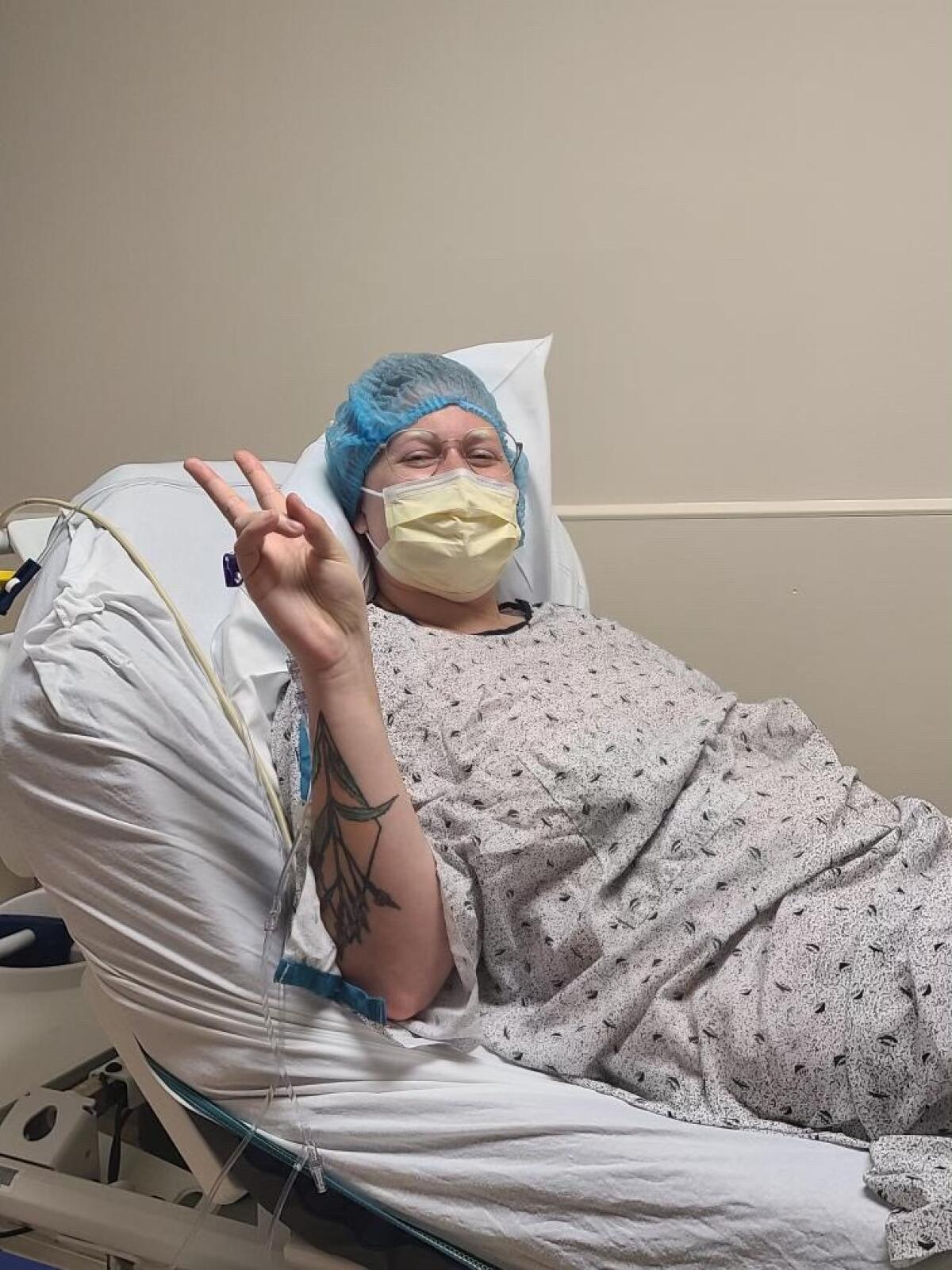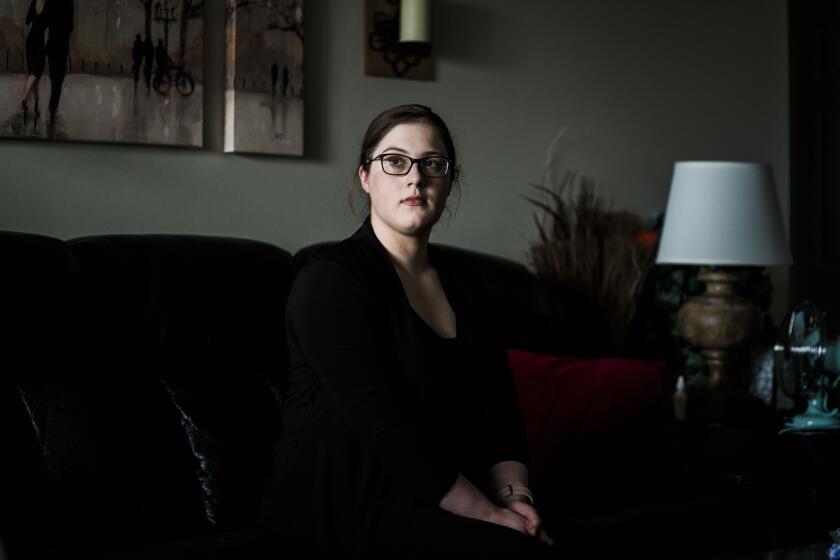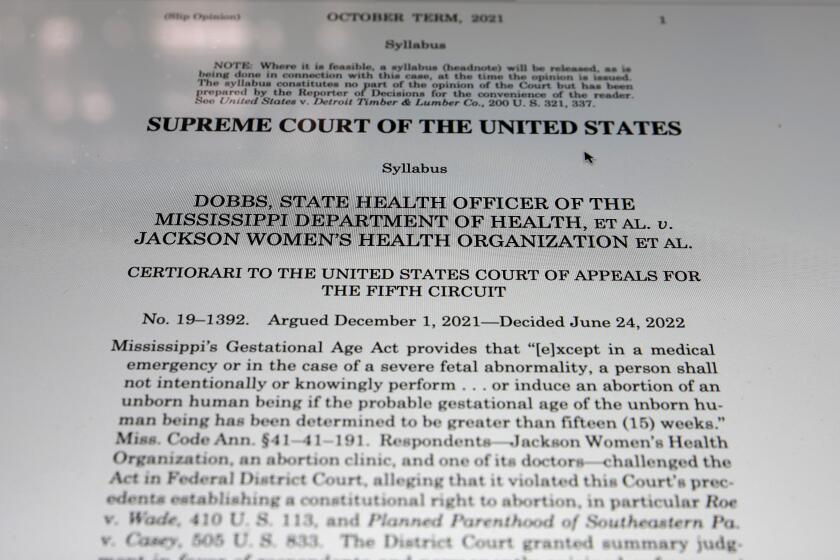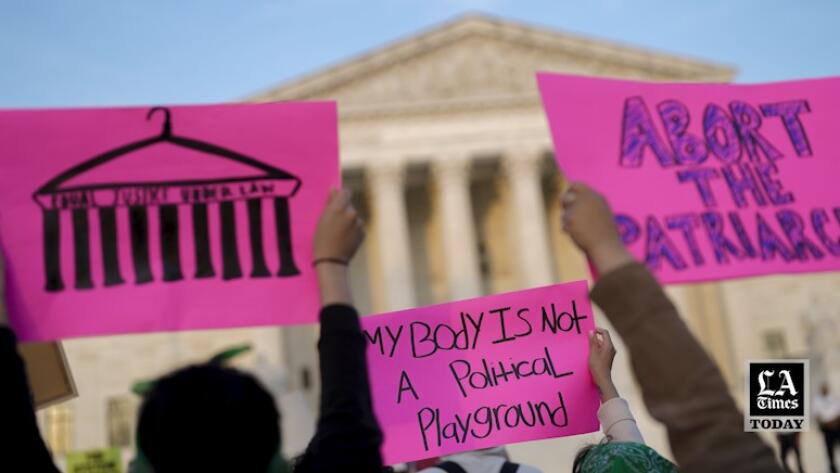More women are seeking sterilization since Roe vs. Wade was overturned

On the morning of May 3, Abby C. burst into tears when she learned that a leaked draft opinion signaled the U.S. Supreme Court would likely overturn Roe vs. Wade.
Before getting out of bed, the 23-year-old booked a consultation to begin the process of getting sterilized. Abby, who did not want to use her last name for privacy reasons, said her previous gynecologist had dismissed her requests, citing her age. But with the leaked opinion throwing the future of reproductive rights into jeopardy, Abby stood firm in her decision.
“I ended up telling her, this is the option I want,” Abby said. “This is the only answer for me.”
It wasn’t until after she woke up from the procedure — a bilateral salpingectomy, in which her fallopian tubes were removed — that she felt relief.
Following the decision in Dobbs vs. Jackson Women’s Health Organization, which overturned the once constitutionally protected right to an abortion, young women and others across the country have increasingly requested sterilization, according to obstetrician-gynecologists who have seen an uptick in Arizona, North Carolina, Texas and Florida.
Dr. Diana N. Contreras, chief healthcare officer of Planned Parenthood, said after the Supreme Court’s decision, the organization saw a huge spike in traffic to its web pages explaining how an individual can get a vasectomy or sterilized.
Among consequences to the end of Roe vs. Wade: Rheumatology patients lose access to a crucial drug. Why? It can be used to end ectopic pregnancies.
In interviews, women who are planning to remain child-free said they pushed up their timeline to get sterilized. Others said the Supreme Court decision made them consider sterilization more seriously, out of concern that reproductive rights would be continually stripped.
In San Antonio, Dr. Michelle Muldrow said the number of women coming into Innovative Women’s OB-GYN requesting sterilization is unlike anything she has seen.
“I’ve had more consultations for sterilizations in volume per patient load than I’ve ever had in my career,” Muldrow said Wednesday. While she used to see a couple of patients for sterilization every now and then, she now conducts consultations daily.
“Never before have I seen so many women in such a panic or state of anxiety about their bodies and their reproductive rights,” Muldrow said. “They feel like this is their only option.”
A look back at U.S. abortion laws and the Roe vs. Wade decision.
Dr. Kavita Shah Arora, an OB-GYN in North Carolina and ethics committee chair for the American College of Obstetricians and Gynecologists, said she has noticed “a dramatic increase” in the number of women requesting sterilization both in her own practice and in conversations with colleagues across the country.
One of her recent patients, who already has children, was previously unsure about permanent contraception, she said.
“The Dobbs decision pushed her over the edge to scheduling the surgery as she wanted to retain bodily autonomy and have independence over her decision-making,” Shah Arora said.
Many women said that opting for sterilization was their way of retaining control at a time when they feared lawmakers would continue to chip away at reproductive rights, including contraceptives and sterilization.
But the procedure is not always easy to secure. It has a long, complex history in the United States. Historically, women, often from marginalized groups, have been forcibly sterilized without their knowledge. Because of that, the American College of Obstetricians and Gynecologists recommends an ethical approach with patients, while also taking precautions against “coercive or otherwise unjust uses.”
Sometimes young women, especially those in their 20s who are unmarried and without children, face pushback from healthcare providers who strongly discourage the procedure out of fear that the patients might change their minds in the future. A 1999 study found patients under 30 reported a higher rate of feeling regret after the surgery.
OB-GYNs say their job is to make patients feel respected while ensuring they make informed choices and understand the risks and benefits, Muldrow said.
“If someone’s been thinking about it long enough and decided upon it, we have to respect that,” said Muldrow, who can be found on a list circulating online of healthcare providers who are willing to perform tubal ligations on younger patients, no matter their marital status. She’s had patients in their early 20s cry with relief when she approved their requests.
It used to be that the more common sterilization method was tubal ligation, a procedure in which the fallopian tubes are blocked, burned, cut or tied. While doctors still perform the procedure, the current standard calls for a bilateral salpingectomy, in which the fallopian tubes are entirely removed.
Dr. Melodie Zamora, an OB-GYN in San Antonio, said the dynamic of the conversations has shifted in recent weeks among her patients. Texas has long had restrictions on abortion, but the ban is forcing patients “to think about the extreme.”
“Now that the option [of abortion] has been completely taken away, women feel more responsibility, or a sense that they have to do something that is going to be in the ‘100% successful’ category to never have to be in a situation where they say, ‘Where do I go now?’” Zamora said.
Watch L.A. Times Today at 7 p.m. on Spectrum News 1 on Channel 1 or live stream on the Spectrum News App. Palos Verdes Peninsula and Orange County viewers can watch on Cox Systems on channel 99.
Brandi Shepard, a 26-year-old living in Ohio, said she felt she had little choice but to get sterilized after the Dobbs decision. When she was 21, she said, her doctor dismissed her request for sterilization and told her they would revisit the topic when she was older.
Five years later, Shepard’s feelings have not changed. On the day the U.S. Supreme Court overturned Roe vs. Wade, something she thought would never happen, she asked her health insurance provider if it covered sterilizations. It did and she scheduled a consultation the same day.
She has been approved for a bilateral salpingectomy. While children were never in her plans, Shepard said she felt frustrated over having to scramble to get the procedure earlier than she anticipated.
“Because of Roe being overturned, it is causing me to undergo a major surgery and take on the complications and risks that come with it just so that I don’t have to worry about carrying an unwanted pregnancy,” she said. In Ohio, legislators approved a “heartbeat” law, which bans abortions after six weeks. Already, state lawmakers are drafting a bill that could effectively ban nearly all abortions and some methods of birth control.
Access to abortion meant Shepard could pursue a child-free life, she said. But lawmakers appear determined to take away her choices.
“I’m pissed. It’s insane that this is what I had to do to maintain bodily autonomy,” she said.
Hannah Morgan, 35, of Missouri said getting sterilized wasn’t an option she seriously considered until the Dobbs decision. She has been on birth control for 20 years, trying just about everything — intrauterine devices, hormonal pills. But none offered a permanent solution. With Missouri among one of the first states to ban abortions, it felt like “now or never,” she said.
“Abortion’s not an option that most people want to consider, but it’s always there as a last resort,” Morgan said.
Now, she added, “I can’t rely on anything anymore. I just need something permanent so I don’t have to add this to my list of worries anymore.
“It’s scary what’s happening,” said Morgan, who lives in the Kansas City metro area. “All the rights that have been fought for ... and it’s like ‘Nope you can’t have that anymore.’”
In Orlando, Fla., Dr. Matthew Wollenschlaeger said he went from consulting one or two patients a week about sterilization to about a dozen after the Dobbs decision leaked.
His typical patients used to be women from all over Florida. Now the practice has grown to include Georgia residents, Canadians and transgender men seeking hysterectomies. Wollenschlaeger said he had to request hospital privileges at a second location to accommodate his patients.
Florida legislators have banned abortions after 15 weeks of pregnancy but many patients expressed fear that state lawmakers will move quickly to implement a total ban, Wollenschlaeger said.
“People feel like they’re racing against time. That’s the prevailing sentiment,” he said.
Ciara Walter, 33, said her decision to get sterilized came after the Dobbs decision was leaked. The Pittsburgh resident said she knew she did not want to have children but felt unsure of what path Pennsylvania lawmakers would pursue when it came to reproductive rights.
“I almost feel like they’ll start with this, and what’s next?” Walter said. She rushed to schedule a bilateral salpingectomy after the leak and had her surgery June 29.
Catherine K., a 27-year-old in Minnesota, said that although abortions remain accessible in the state, she fears the influx of anti-transgender bills and signals from the Supreme Court to overturn gay marriage and restrict access to contraception are signs of difficult times ahead.
Catherine, who did not want her last name published due to privacy concerns, said she booked a consultation appointment to begin the process.
“I thought, well, now is as good a time as ever,” Catherine said. “I am very afraid of the way things will continue to go because I feel that this is only the beginning.”
More to Read
Start your day right
Sign up for Essential California for news, features and recommendations from the L.A. Times and beyond in your inbox six days a week.
You may occasionally receive promotional content from the Los Angeles Times.









